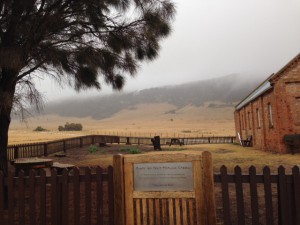Family is intimacy. Violence destroys.
That the two words: family and violence are joined in Australia today is violation.
Violation of love, trust, honour, dignity, compassion, vulnerability, togetherness, health – a violation of wholeness, integrity, of all that is family.
The idea that family violence and domestic abuse should happen is unthinkable.
That, in fact, it does happen is shattering.
Shattering of family.
- Shattering of that hallowed trust: the family.
- Shattering of intimacy, love, vulnerability and safety.
- Shattering of body, minds and spirits.
- Shattering of families, friendships and society.
- Shattering of our stereotypes and stereotypical responses.
Australia, Tasmania, we are broken, our true humanity shattered: that is what violence in our families and abuse in our domestic life has brought upon us.
Where can we start? What can we do?
- As we have done, we must grieve with victims.
- We must break the silence about violence and coercive behaviours.
- We must prioritize the safety and care of victims.
- We must recognize and challenge abusive behaviours especially within our midst.
- We must work effectively toward the healing of women, children and men.
- We must recognize and confess our mistakes in our understanding and responding to victims of family violence and domestic abuse.
- We must learn and receive training in pastoral care.
- We must learn from others, and work in partnerships with them.
- We must change our culture to value the innate dignity and value of every person: every woman and man, girl and boy – whoever they are and wherever they may be.
- We must reflect the heart of Jesus.
But we Christians have made mistakes in responding to family violence and domestic abuse.
So let us be specific about how in the Church our theology can lack the wisdom of pastoral care, and how we have misapplied theology, adding to the harm suffered. The following examples will show that this problem of misapplying theology, is made worse if we try to deal with an issue as complex as domestic violence, without first taking the time to learn more about its common patterns and pitfalls.
Example 1: Hard work is required of offenders.
Sometimes the problem has been that we have been so convinced of the importance and liberating power of a particular doctrine, that we use our favourite packaging of that doctrine as the first step, or even worse, the only step or tool, to help deal with issues, even those issues as complex as domestic violence.
For example, some clergy have rushed to pronounce absolution (forgiveness) and reassurance to the perpetrator.
There is nothing wrong with the theology of absolution, but had we taken the time to become more aware of the high re-offence rate, and the layers of minimizations and projections of blame that family violence offenders use to blind themselves and resist change, we would have proceeded much more slowly and carefully.
In fact, if we want to talk about the grace of God to these offenders, it is best to avoid absolutions or passages like Psalm 103 verse 12, ‘as far as the east is from the west, so far has God removed our transgressions from us’. Otherwise, just as alcoholics do, offenders will just misuse these precious words to give them even more fuel to avoid facing up to what they keep doing, and thereby avoid responsibility for the hard choices ahead.
Instead, when the time is right, we can talk about the utter grace and welcome God offers when we are prepared to learn to live continuously all day long in the light, fully seen and not kidding ourselves, as the First Letter of John chapter 1 puts it. If we offer to help an offender learn to live 24/7 ‘in the light’ where his failures, beliefs and self-talk are continuously opened up to God, we have more of a chance to work with him on his blindfolds, and his projections of blame, minimizations, etc.
However, do not raise the hopes of the offender’s partner, as offenders have strong self-defence mechanisms. It is much safer for a woman suffering violence or abuse if the offender moves out while working on these or other issues with specialist agencies.
Oh Lord, teach us to be better shepherds.
Example 2: Forgiveness does not equate to restoration of relationship.
It is true that God’s grace is available for all, and that God calls us to extend that forgiveness to others. Our fault is that in the case of family violence, we have too often applied these in a simplistic fashion that has not helped either victims or offenders. Some have applied the forgiveness issue in ways that resulted in women feeling obliged to stay in very violent situations. Let’s look again.
We know that ‘forgive one another’ is God’s command, and also his gift because it assists both the ‘wounded person’ and the ‘wounding person‘, to gain freedom from the past. In time it permits the wounded one to move forward even though they have been badly hurt – so yes, our goal is certainly to forgive the past. Forgiveness is about the past. But you can’t forgive the future!
I believe some of us have misapplied this when we conveyed that the second part of the question about what happens in the future, must always have only one answer – we have conveyed that forgiveness of the past in every case has to lead to restoration and reinstatement in the future. I don’t believe this is true.
When the problem is that someone has repeatedly abused their position of ‘power and authority’ to severely damage those they had ‘power over,’ being forgiven does not bring with it an automatic right to be reinstated back into that same position of ‘power and authority’.
This is especially so where those ‘without power’ would be at risk of severe and lasting damage. One can forgive the past, but still make a separate choice that protects the vulnerable into the future.
For example, some women once married to very dangerous men have come to a place where they can forgive the past, but they live under assumed names, because to do otherwise is to risk their future. Were we to insist that a woman and her children risk their lives and sanity to go back to a very violent man, I suspect we would be in the category for which Jesus condemned the Pharisees ‘you load people down with a burden they can hardly carry, and you do not lift a finger to help them.’ (Luke 11:46)
Now that we are even more aware of the long term damage to children who live with family violence or domestic abuse, we need to be even more careful in the way we apply forgiveness of the past that it does not in every case lead to restoration and reinstatement in the future.
Oh Lord, teach us to be better shepherds.
Example 3: Violence violates the marriage covenant.
We can rightly be committed to preserving marriage, but we have sometimes laid the blame for a destroyed marriage on the wrong person. It is terrorizing and repetitive violence that has broken the covenant of the marriage, not the need for refuge and safety.
Oh Lord, teach us to be better shepherds.
Please hear the following apology. It comes from my heart.
- To those who have been harmed by violence and abusive behaviours, we say sorry for any ways we have made your journey even harder.
- We are sorry for those times when church leaders were slow to listen or slow to believe or understand your story.
- We are sorry for those times we did not recognize how cruel and controlling a range of abusive behaviours can be.
- We are sorry if you were not told emphatically or often enough that the violence is never your fault, and that abuse is not love.
- We are sorry when our attempts to help have left you and your children exposed to more risk.
- We are sorry for those times when our theology has lacked the wisdom of wise pastoral practice.
- We are sorry when we have made you feel weighed down with a sense of failure and feeling responsible to make things right.
- We are sorry for those times we thought we knew best, but you really needed to make your own decisions in your own time.
The audio of the sermon Hear our Cry can be found here
A copy of the Hear our Cry order of service is available here: Domestic Violence Service July 2015
You might like to listen to the sermon Domestic Ephesians 5 (Domestic Violence) preached on Sunday 12th July by the Dean of the Cathedral, The Very Reverend Richard Humphrey.
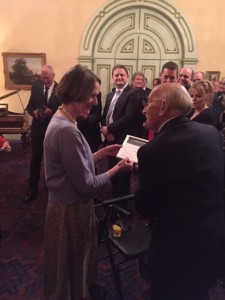 It is always good to celebrate 100 years! And we all love a party!
It is always good to celebrate 100 years! And we all love a party!
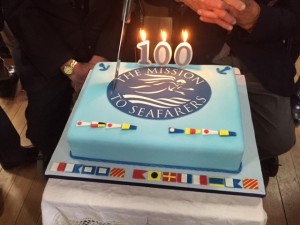
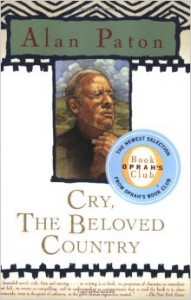
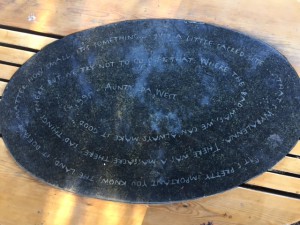 I spent time Thursday afternoon of NAIDOC Week 2015 at Wybalenna on Flinders Island, Tasmania, and reflected on the terrible tragedy of the indigenous suffering, dispossession and death.
I spent time Thursday afternoon of NAIDOC Week 2015 at Wybalenna on Flinders Island, Tasmania, and reflected on the terrible tragedy of the indigenous suffering, dispossession and death.